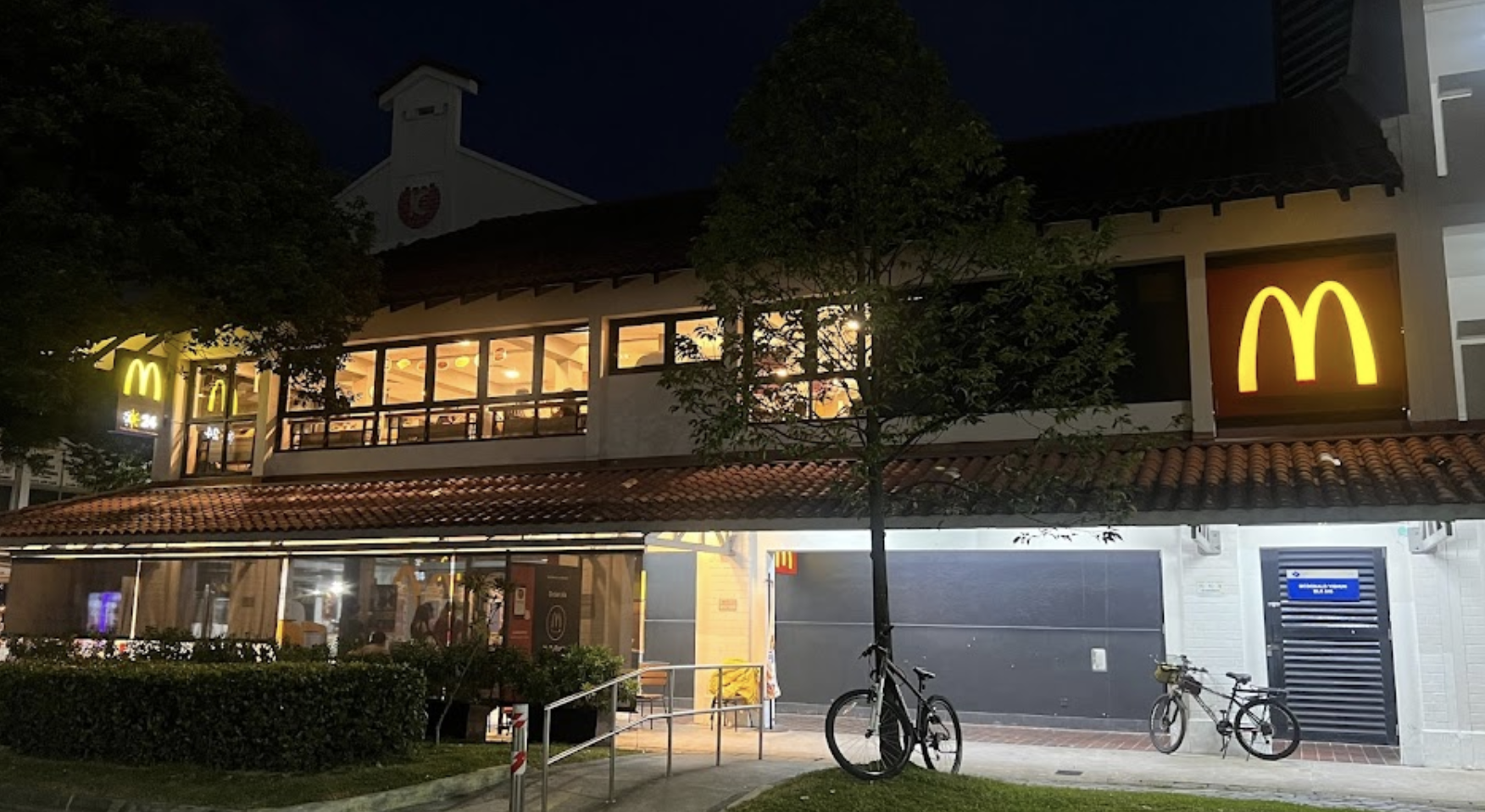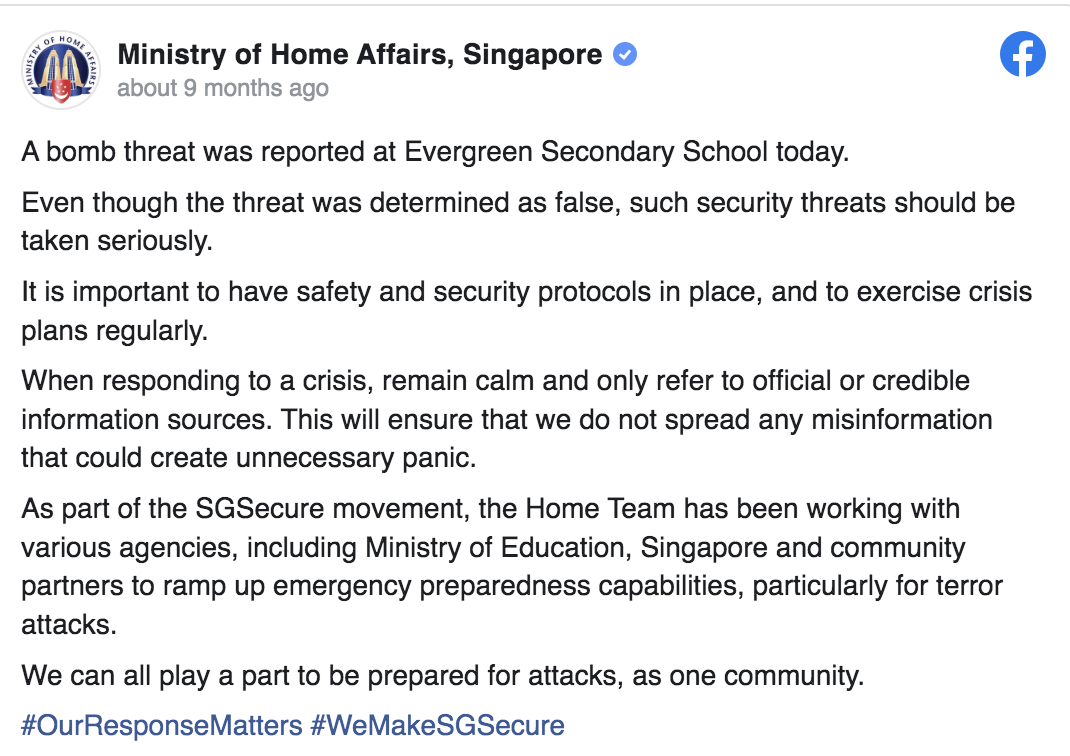Last Updated on 2023-05-05 , 12:10 pm
Terrorism prevention exercises in school always train us to stay alert—report anything suspicious you see left unattended.
However, it’s still important to exercise discretion in doing so—communicating false information to the police is a crime, after all.
Last week, the police were alerted to a bomb threat at Yishun, but found nothing amiss in their search.
Found Nothing After Checks
On 20 April at around 10 pm, the police received an alert about a bomb threat at a McDonald’s outlet, located at Block 846 Yishun Ring Road.

When they arrived at the scene to investigate, they found no “threat items” after conducting extensive security checks.
In light of this, the police are now investigating a case of communicating false information about a bomb threat, an offence that carries a jail term of up to seven years, a fine of up to $50,000, or both.
They reminded the public that all possible security threats are taken seriously, and people who intentionally (falsely) cause public alarm will be investigated.

Cases like these are classified under Section 268A of the Penal Code 1871.
Dine-in Not Allowed During Checks
In an interview with Shin Min Daily News, 40-year-old delivery worker Mr Zhuo revealed that customers could not dine in at the outlet during the security checks.
He had gone to the outlet that day to pick up a delivery order, and noticed police officers investigating something there.
“While I was there, I saw customers being told that they could not dine in or access the second floor, and could only order takeaways. The police were investigating the surroundings, and it seemed like they were searching for something,” he said.
According to him, the McDonald’s workers refused to disclose what was happening.
However, he heard from someone there that a person had told the police there was a bomb at the scene, but it was later found to be a false alarm.
Other False Bomb Threats
On 21 July 2022, parents of students attending Evergreen Secondary School were informed by the school not to send their children to school, due to a possible bomb threat.
After the police carried out a comprehensive sweep of the compound, the threat was determined to be false.
The bomb threat had been reported to the police by the school staff at around 7.40 am, and all students on school premises at that time were accounted for and sent home.
Even after the threat was deemed false, the Ministry of Home Affairs (MHA) released a statement on Facebook, reminding the public that all threats like these “should be taken seriously”.

They added that having safety and security protocols in place to deal with these threats was paramount, and crisis plans must be exercised regularly.
Citing the SGSecure movement, they expressed that relevant authorities, including the Ministry of Education, have worked together to ensure preparedness for possible terror attacks.
Is The Terror Threat Real?
But are terrorist threats really so pressing in Singapore?
The answer is unfortunately yes, according to SGSecure.
Their website informed the public that the terror threat in Singapore remains high, despite no current specific or credible information regarding possible terrorist attacks against Singapore.
Especially as pandemic restrictions relax and cross-border travel returns to normal, terrorist elements may be incentivised to carry out plans previously put on hold.
They added that Singapore still faced a significant terror threat from violent Islamist terrorist groups and their virtual network of followers, who often use the internet to spread their violent ideology through propaganda, conduct fundraising for their cause, and plan terror attacks.
Singapore also faces a self-radicalisation threat—in recent years, radical ideologies have propagated online, leading to Singaporeans falling prey to these sorts of malicious content.
Since 2015, 45 self-radicalised individuals residing in Singapore have received Orders of Detention or Restriction Orders, under the Internal Security Act.
What Is Self-Radicalisation?
Self-radicalisation occurs when individuals consume extremist propaganda released on social media by radical groups and start believing in the ideology the content pushes.
They are then spurred to act on these hostile ideologies, which usually urge them to conduct violent attacks against specific groups of people that their ideology condemns.
Unfortunately, violent extremist content is no longer hard to come by on the internet—the 2019 terror attacks on two mosques in New Zealand were live-streamed online, with clips of the incident uploaded across popular social media websites like Facebook and Youtube.
In 2020, a 16-year-old Singaporean student, inspired by the live stream he watched, plotted an attack on two mosques in Singapore as well. He was later detained under the Internal Security Act (ISA).
15-year-old Detained Under The ISA
In November 2022, a 15-year-old secondary three student was arrested under the ISA after being self-radicalised by terrorist propaganda online spread by Islamist extremist groups Al Qaeda and ISIS.
When investigated, he admitted that he had plotted terrorist attacks against Singapore, and intended to employ violent means to establish an Islamic caliphate.
He is currently the youngest person to be arrested under the ISA.
The 15-year-old believed that “disbelievers”, which included non-Muslims and Shia or Sufi Muslims, should be killed.
He also expressed great support for the actions of terrorist groups like ISIS, and desired to live under their regime.
Because of these beliefs, he considered attacking non-Muslims in tourist areas in Singapore with a knife, hoping to behead them.
He also fantasised about being a suicide bomber, viewing “dying as a martyr” as the responsibility of all Muslims.
He even joined ISIS-themed servers on the popular gaming platform Roblox, intending to mimic the group’s actions in the game.




